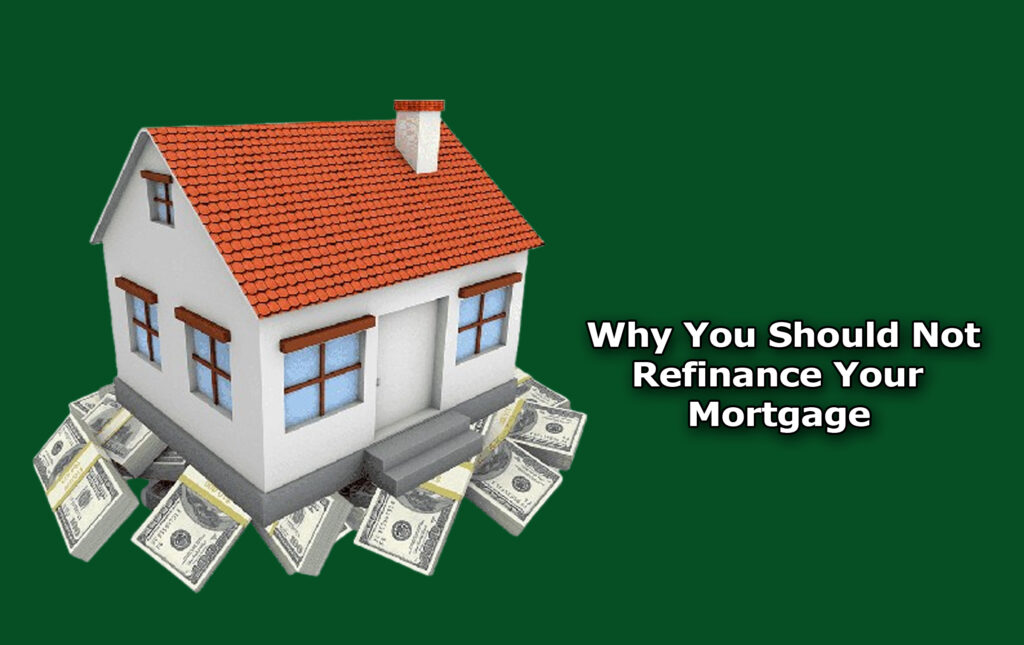Why should I not refinance my mortgage? When interest rates drop or your financial situation changes, refinancing your mortgage might seem like an obvious choice.

After all, who doesn’t want to pay less each month or get a better loan deal? But refinancing isn’t always the right move, and in some cases, it can do more harm than good.
It’s easy to get drawn in by the idea of saving money, but the truth is that refinancing comes with its own set of costs, risks, and long-term consequences.
Many homeowners don’t realize that refinancing can restart the clock on your mortgage, stretch your loan term, and come with closing costs that cancel out any savings.
You might even end up paying more in interest over time, even if your monthly payments go down. Plus, if you’re planning to sell your home soon or don’t plan to stay put for much longer, refinancing might not be worth it at all.
Before making any decisions, it’s important to look at the full picture and think about your goals. Refinancing isn’t one-size-fits-all; it works for some, but not for everyone.
In this article, we’ll explore the reasons why refinancing your mortgage might not be the best idea, and when it’s better to stay with the loan you already have.
Reasons Why You Should Not Refinance Your Mortgage
Here are several reasons why refinancing your mortgage might be a bad idea.
You Might End Up Paying More in the Long Run
Refinancing often lowers your monthly payments, but it can also extend your loan term. For example, if you’ve been paying on a 30-year mortgage for 10 years and refinance into a new 30-year loan, you’re now committing to 40 years of payments total.
Even with a lower interest rate, the extra years can lead to more interest paid over time. So, while your monthly payment may feel more affordable, the total cost of your loan might increase significantly.
Closing Costs Can Cancel Out Your Savings
Many people forget that refinancing isn’t free. Just like your original mortgage, a refinance comes with closing costs; things like lender fees, appraisal charges, and title services.
These costs can add up to thousands of dollars. If you’re not planning to stay in your home long enough to make up for those fees with monthly savings, you could actually lose money by refinancing.
It Could Hurt Your Credit Score
Refinancing involves a hard credit check, which can slightly lower your credit score. On top of that, opening a new loan changes your credit profile, which can also impact your score temporarily.
If you’re planning on applying for other types of credit soon; like a car loan or new credit card; it might be smart to avoid refinancing for the time being.
Restarting Your Loan Term Isn’t Always Wise
Even if you get a better rate, starting over with a new loan term can be a step backward. If you’ve already paid off a large portion of your mortgage, refinancing resets the clock and pushes your payoff date further into the future.
This might not be a big deal if you’re early in your loan, but it can be frustrating if you were close to owning your home outright.
You Could Lose Access to Helpful Loan Features
Some original loans come with perks, like forgiveness options, flexible payment plans, or favorable terms for hardship situations. When you refinance, you may lose those benefits.
That’s why it’s important to read the fine print and understand what you’re giving up before moving forward.
Bottom Line
Refinancing your mortgage can be a smart move in some situations, but it’s not always the best choice. Before jumping in, take the time to weigh the pros and cons based on your goals, finances, and how long you plan to stay in your home.
Saving money on monthly payments might sound appealing, but it shouldn’t come at the cost of paying more in the long run. Always crunch the numbers; and when in doubt, talk to a financial advisor who can help you figure out what’s truly best for your situation.



